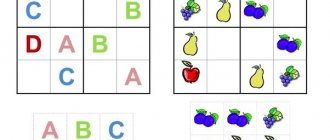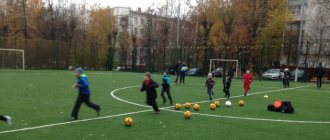5-7 years, or senior preschool age, is an important period in the personal and psychological development of a child, as well as in the development of thinking, will, and attention. This is the so-called preparatory age, after which the child will move to a new stage - and the crisis of 7 years will begin, characterized by a change in the leading type of activity from play to learning, an increase in independence and social environment.
To help your child go through this stage correctly, you need to know the age characteristics of older preschoolers, the characteristics of this age and areas favorable for development. Don’t forget that your child’s health is the basis of his successful future, so he needs to be helped, and not forced to do and be able to do what he does not yet have the capabilities to do.
Nursery
The youngest pupils are accepted into the nursery group of the kindergarten. Their age ranges from 1 year to 2-3 years. They are usually located on the ground floor; the furniture in the group corresponds to the height of the children.
Classes are provided on the development of speech, music, and the surrounding world, in accordance with the plan. Classes are conducted by a teacher in a group and last no more than 10 minutes.
Toys are also selected according to age: large cubes and pyramids, rubber animals and baby dolls, balls, cars, children's sets for playing with sand, dolls, doll dishes, baby books - all without small and dangerous parts.
The daily routine in the nursery group differs from that of older children: early breakfast, lunch, afternoon snack, dinner. Going to bed early for a quiet hour.
There should be no more than 10-15 children in such a group. The presence of a nanny is required to help dress and undress the children, feed and wash them, and put them to bed.
There is usually only one holiday - New Year, and it is also celebrated in a group.
Short stay group (STG)
As a rule, very young children from 1 to 3 years old are enrolled in the short-stay group. This service can be used by any interested parent who has submitted the necessary documents and joined the queue. Such groups work 3 times a week for 3 hours in total.
Classes there start at 8:30 and last until 11:30. There is also an evening shift from 16:00 to 19:00. It all depends on the schedule of classes at the educational institution, so always check the opening hours at your garden.
Note to parents
Most often, parents worry about at what age to send their child to kindergarten and whether it is worth doing it so early, because children from 1 to 3 years old still need their mother’s presence. It is especially difficult for parents to make a decision if this is the first baby in the family.
Staying in kindergarten is the very first and most important experience for every child. Here he learns to show his personal qualities and communicate with peers.
If we omit the details, the opinion of many experts agree on one thing: from a psychological point of view, meeting and communicating with children in a playful and relaxed manner helps the child adapt and enter society. After all, in this society the child will grow and develop, gain experience and experience different stages of personality development. And the sooner the child begins to adapt, the better it will be for his psychological health.
It should be noted that young mothers and fathers should also be prepared for such a responsible step.
And before you send your child to a short-stay group, make sure that this is exactly the place where your son or daughter will be comfortable.
Today you can quickly find reviews on the Internet about any product or service. Look for reviews and comments about your kindergarten. And you probably know mothers whose children also go to this kindergarten. You can also come to the kindergarten and see everything with your own eyes, and chat with the nannies and teachers.
What activities are conducted with children in short-stay groups?
Typically, such groups have 2 classes a week of physical education and music and once a week classes in drawing, modeling, literature and design.
It’s also not difficult to sign up for GKP groups. They are available in almost all preschool institutions. To be included in the group, you must:
- contact the head of the kindergarten with a request to enroll the child in the GKP. If there are places in the group, you will definitely be accepted;
- if there are no free places, contact the so-called “Mini-OSIP” (this is the district information support service).
- You can also sign up for the group through the city services portal
When you have found a place, you need to worry about documents for the garden. There are not many of them, but you will have to collect them quickly:
- passport of the parent or legal representative of the child;
- baby's birth certificate;
- child registration in the city;
- if you have benefits, also provide a document for inclusion in the preferential category;
Enrollment in the GKP occurs in the same way as in a regular kindergarten group. You are put on a waiting list and when a place becomes available, they call you and inform you that your child can go to kindergarten.
Procedure for enrollment in a short-stay group.
When there are few free places in a group, the head of the kindergarten must follow certain rules when enrolling a child in the group. For example, your child will be accepted faster if:
- your family (or child) lives/is registered in this area;
- preferential categories of children
If all children from this list are enrolled, then in order of priority the following are enrolled:
- children with temporary registration
- kids from other areas
A parent does not have to go to the daycare every week or month to find out if a place has become available. Typically, parents are sent an email notification or receive a call on their cell phone.
When enrolling in kindergarten, check the availability of a medical card, and immediately before enrollment you must provide:
- contacts of the child and his parents;
- complete blood count and urine test;
- analysis for enterobiasis and worm eggs
Before enrolling a child in a kindergarten group, the parent will have to sign a service agreement, which will spell out all the rights and responsibilities of both parents and teachers.
As a rule, documents of this kind protect both parties from possible claims. Therefore, every parent should not be lazy and read this agreement carefully.
Features of children staying in a short-term group
The child is not in kindergarten all day, but only for some part of the day, so meals are not provided here. But any baby can freely ask for water. So before you send your son or daughter to kindergarten, don't forget to feed him.
Adaptation in the group is quite smooth. Any parent can go to the group and see how their child feels there. This makes it easier for the baby to survive a long separation from his parents and get comfortable in a new environment. Remember also that the child’s psyche is quite vulnerable at this age, and any innovation can have a bad effect on his emotional state. But if you prepare your baby and send him to a short-term group, you can avoid negative emotions on the part of the baby.
The first days in the GKP last only half an hour for a child. Then the stay time becomes longer, but it all depends on the child’s behavior and addiction. Often educators recommend starting with half an hour and adding only 15 minutes every few days so as not to escalate the situation.
Approximate schedule for short-stay groups:
- Monday - 9:00-9:10 music games; 10:10-10:20 didactic games;
- Tuesday—10:00-10:10 movement development, 10:30-10:40—artistic creativity (drawing, modeling, appliqué, coloring must alternate here);
- Wednesday—9:00-9:10 didactic game, 10:00-10:10 speech development;
- Thursday—9:00-9:10 outdoor game; 10:00-10:10 games with building materials;
- Friday—9:10-9:20 educational game; 10:00-10:10 music game
The average monthly cost of GKP is about 1,500 rubles. However, if you have benefits, you can write an application for payment compensation (or part of the compensation).
What additional expenses does the parent expect?
Many kindergartens and groups also have additional expenses, which most often depend on the director of the kindergarten. This point should also be discussed in advance, and it is best to do this at the time of signing the contract with the garden. Although, the times when huge gatherings were held in gardens are long gone.
However, some parents face actual extortion. In this case, you should contact the anti-corruption hotline.
Junior
The younger group is attended by children aged 3 to 4 years. These are more independent children who know and can do a lot.
Drawing, physical education and music lessons with specialist teachers, drawing and modeling are added to the main classes. The duration of the lesson is 15 minutes.
Children at this age love to play role-playing games, so among the toys there are various, but simple, children's sets of a doctor, a hairdresser, a builder, a cook, as well as all kinds of construction sets with large parts and figures.
Reading books may contain a longer and more detailed plot. There should also be books with riddles and simple coloring books with a simple silhouette or outline.
In the younger group, in addition to the New Year, a holiday dedicated to March 8 is often organized for children, and they are held in a large music hall.
Many children at this age already speak well, so for performances at holidays they can be given poems and small roles to memorize together with their parents.
Average
The age of children in the middle group is from 4 to 5 years. They are already more physically developed, love to play outdoor games, and acquire the first skills in using simple sports equipment (balls, hoops, skittles, gymnastic sticks, etc.). Therefore, in the middle group of kindergarten they conduct much more physical education classes and physical education minutes, including outside.
Classes such as mathematics, literacy, application, and logic are being introduced. Class duration is 20 minutes.
In many kindergartens, parents are given the opportunity to enroll their children in additional clubs - dance, English, arts and crafts, etc.
Toys and games include cubes with complex patterns for making pictures, lotto and dominoes, educational board games, as well as glove toys for acting out theatrical scenes and fairy tales. Children can now not only listen to a fairy tale to the end, but also, having memorized the roles, show it to children of younger groups.
“Autumn Festival” and “Spring Festival” are added to the main matinees.
What areas are actively developing?
The developmental features of children aged 5-7 years are also determined by the sensitive – that is, the most favorable – period for the formation of personality and social skills. The foundation for the child’s future personality is already being laid.
There is an interest in group games and a desire to be good, the best, the first. This is a positive attitude that is based on a motive for any activity. The child begins to understand: in order to win, you need to take certain actions, make an effort, and not just cry.
Moral and ethical guidelines are formed: what cannot be done, and what can be done, or what is allowed to be done with one’s own toys and things, but not with other people’s. Personal boundaries are drawn up: “You don’t need to yell at me. I don't want to be yelled at. Why can’t I yell at you, but you yell at me?” There is a need for approval and respect from others, a desire to be useful: “I will help you. I'll bring the package."
Children of older preschool age learn to restrain their desires and needs, and understand that not everything can be obtained right now. If the child is explained, he will understand that he needs to wait until his mother finishes cleaning, and then he can go for a walk. The child begins to realize the consequences of his actions: if you haven’t collected your toys, you won’t be able to play with them until the evening.
The image of your “I” is formed. The older preschooler begins to realize what place he occupies in society, in the family (there are adults and there are children), what attitude others have towards him (“Mom and Dad love and protect me”). The child also begins to evaluate himself (I am good, smart, kind). An image of the “ideal self” is emerging, i.e. what the baby would like to be. Most often, he focuses on the closest adults: he wants to be strong, like dad, beautiful, like mom. It is important to maintain this ideal image and transform it into the “Real Me”. Tell your child: “You are strong!” or “You are very beautiful.”
It should be taken into account that at 5 years old a child’s self-esteem is inflated, but closer to 7 years old it becomes more realistic. By this moment, he has already sufficiently developed the ability for introspection, therefore, in familiar situations he evaluates himself normally, but in unusual ones he exceeds his capabilities, since he has not yet developed a mental model of an ideal result. Low self-esteem in a child is a pathology! A consultation with a psychologist is definitely needed in such a situation.
In older preschool age, visual-figurative thinking continues to develop and the foundations of abstract-logical thinking are laid. Sometimes the baby still needs to act with objects, especially unfamiliar ones, in order to understand their purpose, but he is increasingly operating with mental images.
Older preschool children are actively developing attention, memory and the ability to consciously concentrate on any activity. Perseverance is formed, which is a necessary skill when the child goes to school and switches to educational activities. You can read more about sensitive periods of development of certain areas in the article “Sensitive periods”.
Older
The senior group of the kindergarten is attended by children aged 5 to 6 years. Classes are already becoming more intense, in-depth and longer – 25 minutes each.
In addition to the basic ones, classes can be held on the history of the native land and basic handicraft skills can be instilled.
Children can already perform simple exercises from sports such as gymnastics, basketball and some others.
The toys in the group should be varied and age-appropriate: mosaics, puzzles, three-dimensional construction sets with many details.
Children are also taught housekeeping skills. Therefore, among the toys there should be miniature doll gas stoves, cutlery, an ironing board with a toy iron, brooms, dustpans and brooms. You can invite children to care for indoor flowers, aquarium fish, and parrots.
“Christmas”, “Defender of the Fatherland Day”, “Easter”, “Victory Day” are added to holidays and matinees.
Harm from “coaching” a preschooler according to the school curriculum
Yes, at first it will be very easy for the child to learn, because he already knows what his peers are going through. Therefore, he will gradually lose interest in classes. And after the stock of knowledge acquired in preschool age is exhausted, he will simply lag behind his classmates.
This opposite effect is explained by the fact that in elementary school what is needed is not previously acquired knowledge, but developed skills for educational activities. The question immediately arises about whether only the last year of preschool childhood is enough to prepare for school.
In order to simply “train” a child, this time may be enough, but in order to properly prepare for education, it is necessary to start classes in kindergarten in the senior group. Moreover, children’s education should take place in the form of a game, and not parody school lessons.
Preparatory
The preparatory group of the kindergarten is attended by children aged 6 to 7 years. For children, this is a very important, last, final stage before entering school.
There are many developmental and educational activities: reading and mathematics, native speech and the world around us, music and physical education, manual labor and origami, modeling and drawing.
The group often sets up easels and hangers with clothes from various professions for children’s story games. At this age, children are actively learning the rules of etiquette, as well as traffic rules.
Matinees and holidays are elaborate and theatrical. Children can even act as presenters. The graduation party at the end of the year is the most important for children and their parents, where graduates show all their abilities and talents.
Instructions for the teacher for conducting classes
In order for classes in a group of older preschoolers to be effective and interesting for children, the teacher should follow some rules.
- Classes in kindergarten in the senior group involve the presentation of new, rather complex material in the form of a game. This develops visual memory and imaginative thinking well. In addition, the competitive element present in them spurs children to better assimilate knowledge.
- It is worth devoting sufficient time to repetition. But it is not necessary to do this during the lesson; you can do several repetition sessions at the beginning of the month.
- In order not to lose children's attention, you need to monitor the change in their activities. Various types of exercises, games, songs, riddles and dances should be interspersed.
And remember that adults should communicate with children only in a friendly manner. Under no circumstances should you use a commanding tone in class, much less scold a child.
Speech therapy
Children are recruited into speech therapy groups by a speech therapist based on preliminary testing and after a thorough examination. The ONR group includes children with general speech disorders, the FNR group includes children with problems in pronouncing certain sounds.
Pupils, in addition to the main classes, engage in special exercises with a speech therapist and teacher aimed at improving and improving their speech.
In such groups there are usually not many children - 10-12 people. Classes with a speech therapist can be individual or group, and are conducted according to a schedule. All other classes are conducted according to a simplified and facilitated plan, acceptable for children with such defects.
Summer
A summer group is usually a temporary group for the summer period, which is attended by children of different ages. There are usually no classes in the summer, but only outdoor games, reading books, going to puppet theaters or museums.
In any group of a preschool institution there must be two teachers and one nanny.
The day should be organized strictly according to the regime established for each specific age, with games, walks, activities, and entertainment. Each lesson is held no more than 2 times a week.
What is the purpose of classes with preschoolers?
Since the kindergarten has taken over the issue of high-quality preparation of preschoolers for study in the 1st grade, the senior group now takes the same classes as the preparatory group, so that the children have time to develop the necessary skills, perseverance, and the ability to think logically.
The task of the teacher in this case becomes to transfer to children not only the necessary knowledge, but also skills and abilities. This makes it possible to develop curiosity in the child, the ability to work together, independence, and also enriches spiritual and physical culture.
All teachers of preschool institutions must prepare notes for classes in kindergarten. A preschool educational institution that begins to work according to the FOGS system sets the main requirement for training as the presence of various game elements in any of them. Through this form, children acquire the necessary knowledge and skills much better.





